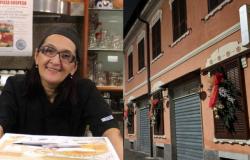of Gaia
Gennaretti
Augusto Filippi was born on 4 May 1924 to my great-grandparents Vincenzo Filippi and Ida Morici, in Serra San Quirico, in the province of Ancona. He had three sisters: Maria, my grandmother Elda and Bianca. After listening to the stories about him from my aunt Agar Brugiavini, who more than all the other grandchildren grew up with grandmother Ida, I recently had the opportunity to do some research on my uncle, Augusto Filippi, at the State Archives of Ancona (in particular in the draft lists of the Municipalities of the province of Ancona and in the army matriculation roles). Once he reached the age to be able to work, Augusto became a railway worker.
When the Social Republic of Salò was formed and the Germans of the Wehrmacht entered Italy, occupying a large part of the Peninsula, Augusto was around 18 years old and already working as a railway worker. Grandma Ida said that, when the deportations of Jews on board the trains began, he tried to delay the departures of these convoys by faking breakdowns and malfunctions of all sorts. Then he was discovered by the Germans and had to flee. So it was that on 18 September 1943 he enlisted as a partisan with the “Lupi di Serra” group which initially settled on Mount Sassone. This unit was made up of the commander, Goffredo Lucarini, Augusto Filippi who was the deputy commander and the partisans Gioacchino Bernabucci, Angelo Biagioli, Piero Ferretti, Renato Fortuna, Aglauro and Rosolino Lucarini. His sisters Elda and Bianca had also taken part, in their own small way, in the Resistance by acting as relays: they brought food to the partisans. In March 1944 the battalion of which Filippi was part was in the Chigiano-Valdiola area (in the territory of San Severino) and, late in the night between the 23rd and 24th, the alarm was received of an imminent attack coming from the south. Four battalions, made up of fascists and Germans, were advancing through the mountains. The Nazi army then attacked the partisans on a very broad front: the units advanced from Matelica on Braccano, from Castelraimondo on Gagliole and from San Severino on Chigiano.
The first position to fall was that of Braccano and, following that, it was the turn of Roti, where the partisan captain Salvatore Valerio lost his life. The fall of Roti left the area of Valdiola uncovered, where the men of the Mario battalion had retreated. Augusto Filippi was among the six partisans who were taken by the Nazis that night, tortured and mowed down with machine guns against the parapet of the Chigiano bridge and then thrown into the Musone riverbed below. My uncle’s body was found right next to that of another young man like him, along the riverbed. One of grandmother Ida’s most frequent stories concerned the night in which Augusto Filippi was killed: he appeared to her in a dream and said “mum, help me, I’m so cold”. Years later, in memory of her, grandmother Ida was given a medal for the sacrifice of her son and the Municipality of Serra San Quirico named the main square, where the family’s home overlooked, after him.






